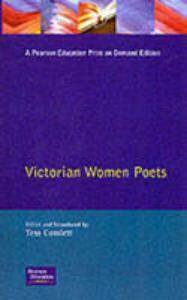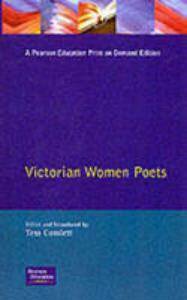
Je cadeautjes zeker op tijd in huis hebben voor de feestdagen? Kom langs in onze winkels en vind het perfecte geschenk!
- Afhalen na 1 uur in een winkel met voorraad
- Gratis thuislevering in België vanaf € 30
- Ruim aanbod met 7 miljoen producten
Je cadeautjes zeker op tijd in huis hebben voor de feestdagen? Kom langs in onze winkels en vind het perfecte geschenk!
- Afhalen na 1 uur in een winkel met voorraad
- Gratis thuislevering in België vanaf € 30
- Ruim aanbod met 7 miljoen producten
Zoeken
€ 71,95
+ 143 punten
Omschrijving
Through her selection of fourteen essays, Tess Cosslett charts the rediscovery by feminist critics of the Victorian Women Poets such as Emily Brontë, Elizabeth Barrett Browning and Christina Rossetti, and the subsequent developments as critics use a range of modern theoretical approaches to understand and promote the work of these non-canonical and marginalised poets. While the essays chosen for this volume focus on these three major figures, work is also included on less well-known poets who have only recently been brought into critical prominence. The introduction clarifies for the reader the themes, problems and preoccupations that inform the criticism and provides a useful guide to the debates surrounding poetry and feminism, investigating such questions as, how feminist are these poems, and does a women s tradition really exist? The advantages and disadvantages of applying different critical approaches, such as psychoanalytic and historicist, to the understanding of this period and genre are also fully explored.
Specificaties
Betrokkenen
- Auteur(s):
- Uitgeverij:
Inhoud
- Aantal bladzijden:
- 296
- Taal:
- Engels
- Reeks:
Eigenschappen
- Productcode (EAN):
- 9780582276499
- Verschijningsdatum:
- 22/10/1996
- Uitvoering:
- Paperback
- Formaat:
- Trade paperback (VS)
- Afmetingen:
- 138 mm x 215 mm
- Gewicht:
- 426 g

Alleen bij Standaard Boekhandel
+ 143 punten op je klantenkaart van Standaard Boekhandel
Beoordelingen
We publiceren alleen reviews die voldoen aan de voorwaarden voor reviews. Bekijk onze voorwaarden voor reviews.









